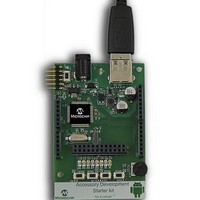DM240415 Microchip Technology, DM240415 Datasheet - Page 48

DM240415
Manufacturer Part Number
DM240415
Description
Accessory Development Starter Kit For Android General Purpose
Manufacturer
Microchip Technology
Series
-r
Datasheet
1.DM240415.pdf
(52 pages)
Specifications of DM240415
Processor To Be Evaluated
PIC24FJ256GB110-I/PT
Processor Series
PIC24F
Data Bus Width
16 bit
Interface Type
USB
Operating Supply Voltage
3.3 V
Design Resources
PIC24F ADK Schematic
Main Purpose
Reference Design, Tablet
Embedded
Yes, MCU, 16-Bit
Utilized Ic / Part
PIC24F
Primary Attributes
Android OS, Development Platform for Accessories, Arduino Compatible
Secondary Attributes
Royalty Free, No Fee Licensed Software Library
Lead Free Status / Rohs Status
Details
Available stocks
Company
Part Number
Manufacturer
Quantity
Price
Company:
Part Number:
DM240415
Manufacturer:
MICROCHIP
Quantity:
12 000
Microchip's Accessory Framework for Android(tm)
8
8.1
What could be wrong?
8.2
There are several issues that could be causing the runtime exceptions in a PIC32 project. Here are some things to check
that might help you find the source of the issue.
1. Check to make sure that you have a heap size defined. The USB host stack uses dynamic memory allocation, thus needs
a heap size defined. To add a heap to the project, go to the linker settings. This can be found in the "Project->Build
Options->Project->MPLAB PIC32 Linker" menu in MPLAB 8. This can be found in the "File->Project Properties->(current
build configuration)->C32->pic32-ld" in MPLAB X.
2. If a heap size is defined you can use the general exception vector to trap the error and determine what address caused
the exception. This can be done using something similar to the following code:
#if
#endif
This will catch the exception and lock the code in a while(1). From this point you can halt the code and look at the address
variable to see what address caused the exception. Use the disassembly listing to determine the corresponding line of C
code.
Though the USB is connected to the accessory now instead of the IDE for debugging, you can still access the ADB interface
through a network. Please see
set this up.
You might also consider using a USB analyzer to determine what is actually happening on the USB bus. Please refer to the
Debugging the USB connection section for more details.
FAQs, Tips, and Troubleshooting
defined(__C32__)
void _general_exception_handler(unsigned
{
}
My PIC32 project gets a run time exception.
How do I debug without access to ADB?
unsigned long
DEBUG_ERROR("exception");
while(1){}
address = _CP0_GET_EPC();
http://developer.android.com/guide/topics/usb/index.html
cause,
unsigned
status)
for more information about how to
43
43
8












